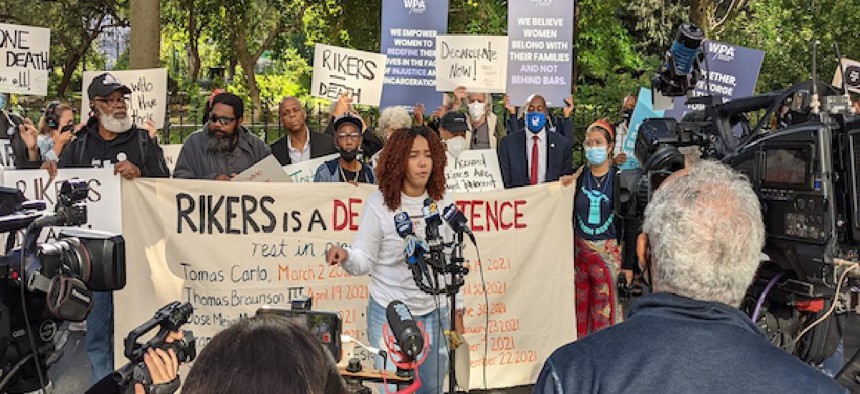The Rikers Island crisis, explained
The New York City jail system has always faced criticism but staffing shortages, overcrowding and a high death toll have led to chaos on the island.

Protesters rallying outside of City Hall, demanding that people be let out of the Rikers Island jail complex due to its poor conditions, on Oct.1. Ryan Rahman/Shutterstock
Calls to reform and eradicate New York City’s infamous Rikers Island jail complex have been growing louder over the past several months due to crowded quarters and a lack of resources made available to the incarcerated people housed within it.
On Tuesday, Reps. Alexandria Ocasio-Cortez, Ritchie Torres and Carolyn Maloney took a tour of Rikers Island and immediately called for actions to be taken to address its overcrowding, such as releasing non-violent offenders who are awaiting trial. “The inhumane conditions we witnessed today are a stain on the City and State of New York,” they said in a joint statement.
The Congressional members are just the latest politicians to survey the jail system and be shocked by the conditions that incarcerated people and correctional officers have to deal with.
While calls to do something about Rikers have been ongoing over the past several years – and decades – the jail has been receiving extra scrutiny lately due to a rise in deaths, a lack of medical and mental health resources and a serious staffing shortage.
So far, 11 incarcerated people have died at Rikers this year and five of those deaths were by suicide. Criminal justice advocates have been rallying for better medical and mental health services at the jail complex, in an effort to avoid any more deaths, as this year’s death toll is the highest yet. The Legal Aid Society filed a lawsuit against the city in early October, alleging that prisoners have not been receiving adequate medical attention.
“DOC can no longer deprive our clients of their right to medical care, and if the Department is unable to guarantee that right, then the court must immediately consider releasing people,” Veronica Vela, a lawyer for Legal Aid, said in a statement.
A majority of people on the island are awaiting trial and have yet to be convicted of the charges being levied against them. Despite the state’s bail reform laws, many judges have been setting bail which has led to individuals who are unable to make bail getting stuck on Rikers.
“We cannot send people to torture and death because they are poor,” Alice Fontier, the managing director of Neighborhood Defender Service, told CBS New York.
On Sept. 17, Gov. Kathy Hochul signed the Less is More Act into law, which prevents people from being sent to jail while they await hearings over alleged technical parole violations, to help alleviate some of the crowding in the city’s prison system but the law will not go into full effect until next September.
Staffing shortages at the jail complex have been caused by the COVID-19 pandemic, which infected 2,200 employees who became unable to work, and a large number of absences among the jail’s officers. On Sept. 20, the city sued the Correction Officers Benevolent Association, the union that represents the jail’s officers, for encouraging its members to take more time off as a form of protest, which is believed to have contributed greatly to heightening the jail's unsafe conditions.
While Mayor Bill de Blasio announced a new five-point plan to make changes to the jail system in mid-September, criminal justice advocates are hoping that the next administration will take the Rikers crisis more seriously and take significant steps to end it and shut it down.
“I was tortured – raped and starved – in Rikers Island. Yet people are still going through what I’ve endured. Too many have died – I mean, have been killed – at the hands of officers. It’s not right. The next Mayor needs to put an end to such abuse,” Candi Hailey, a member of the Jails Action Coalition, said during a rally to close Rikers on Tuesday.
Correction: An earlier version of this story stated that the Less is More Act prevented people from being sent to jail while they await trial.
NEXT STORY: The push to help New Yorkers age in place
